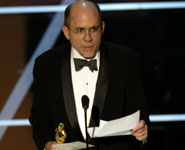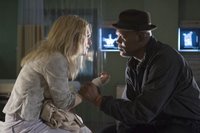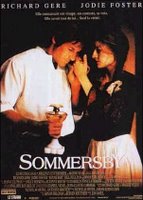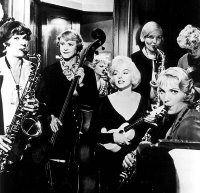
I was flipping channels the other night when I caught a very old, rather funny episode of the pinnacle of '90s yuppydom, Friends. Oh look at them, I thought. All young and idealistic and of a normal body weight- it's touching. And it occurred to me that all of them at one time or another had made their way to the cineplex near you, with results varying from grand success to utter failure. So, at the risk of sounding like the screeching, peppy, j-school dropouts from Entertainment Tonight, I am compelled to ask...
WHERE ARE THEY NOW?
David Schwimmer- a.k.a Ross Geller
"David Schwimmer- yes, he is attractive in an ugly kind of way."- Homer Simpson
Poor David. Condemned to be the despised, up-tight paleontologist, it seems our Mr. Schwimmer is a one-trick pony, appearing in craptacular films such as The Pallbearer and Six Days, Seven Nights. The one exception is the fascinating TV movie Uprising about the rebels who stayed in the Warsaw ghetto after the Nazi's began shipping them off to concentration camps. I wasn't sure about casting Schwimmer- I feared I'd be watching a Holocaust movie and be constantly thinking Hey, look, it's Ross! But I was pleasantly surprised by Schwimmer's steely portrayal of Yitzhak Zuckerman. But Schwimmer apparently seems content at being in films such as Madagascar and dubiously titled comedy Run, Fat Boy, Run which has just been announced, and which he is apparently directing. God help us all.
Courtney Cox-Arquette, a.k.a. Monica Geller
I always hated Monica- the anal, twitchy clean-freak sister of the Geller family. I think the Geller siblings were in fact the most universally disliked, and I always rather admired Cox for playing such an irritating personality. I have a bit of a weakness for this actress actually- I thought she was charming in the Scream trilogy as bloodsucking reporter Gale Weathers, and I even liked her in fabulously trashy Ace Ventura: Pet Detective. She's a "fun" actress to watch- comparable to eating an entire bag of Jolly Ranchers while watching soap operas- you know it's not healthy and is probably killing brain cells, but it has its own special charm. Not a lot of her new movies look terribly promising (one is Barnyard where she voices a cow, another is Zoom about romping teenagers stalked by a killer,) but they'll be good for a Saturday video night.
Matt LeBlanc- a.k.a. Joey Tribbiani
I have just three words for you, people- Lost in Space. 'Nuff said.
Lisa Kudrow- a.k.a. Pheobe Buffay
Kudrow as flaky new-age Pheobe was always under-used in this show, and she's clearly the most talented of the lot of them. From the sly and very funny Romy and Michele's High School Reunion to the dark Opposite of Sex, to her unholy portrayal of desperate sitcom star Valerie Cherish in HBO's The Comeback, Kudrow has consistently proven that she has the comedic grace, wit and timing of anyone. She hasn't announced anything new yet, but her last film was Happy Endings, which alas I have not seen yet, but got some killer reviews.
Matthew Perry- a.k.a. Chandler Bing
This one's a bit of a mixed bag. There was Serving Sarah and Fools Rush In, which were not bad, but not good either. But there was also The Whole Nine Yards, a decent screwball comedy, where the Bingster could use his rather limited range to great effect. To be sure, it was basically Chandler Bing if Chandler lived next to a hit-man (Bruce Willis,) but Perry pulls it off in style. According to the good people at IMDB, he's in an intriguing new film called The Beginning of Wisdom about "the unusual romance between an aged Montana rancher and a young hippie." I'm always interested when a predictable actor is about to work on something a bit unpredictable, and we'll have to see if that range can stretch just a little bit further.
Jennifer Aniston- a.k.a. Rachel Green
Probably the most successful of the bunch since leaving the show, Aniston, is probably also the most talented next to Lisa Kudrow. She's absolutely fabulous in Office Space (I hear the phrase 'pieces of flair' referenced at least once a week). And she showed she had real acting chops when she broke out with The Good Girl, playing one really desperate housewife. Unfortunately she has a dark past with skeletons like Picture Perfect and the truly ghastly Rock Star. But hey, everybody's got to make a buck, and there's still hope for redemption with her most recent, including one called Friends With Money co-starring Joan Cusack, Catherine Keener and Frances McDormand. Who needs Brad anyway?
So here they are- six people who were members of arguably the most famous cast in 1990's television. Some of them will shore up their reserves of talent and perhaps make a real contribution to cinema... some of them will do crappy half-baked spin-offs that make you want to beat whoever put up the dough to produce said piece of schlock. All of them will own their own small country some day and die richer than God.
But one wonders if perhaps as time goes by any of them will become like Kudrow's character Valerie Cherish: former sit-com stars desperate for the spotlight. Unable to break out of the role that defined them.
(Photo courtesy of Hollywood Auditions)











